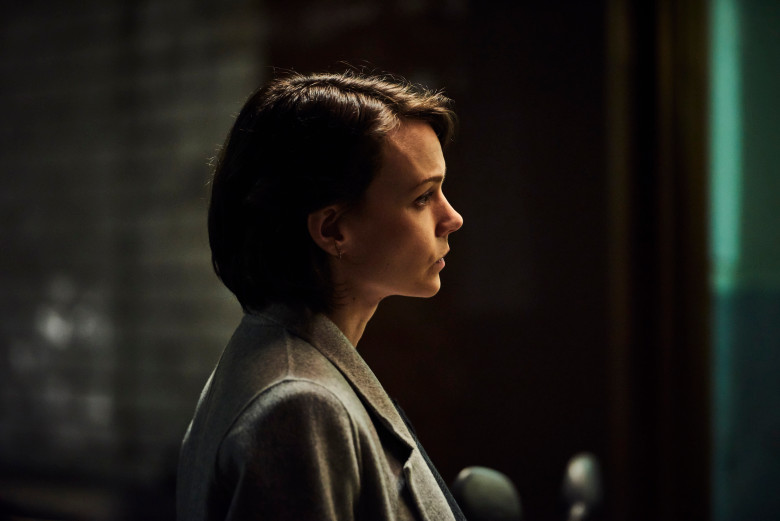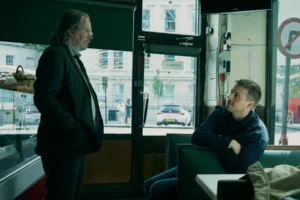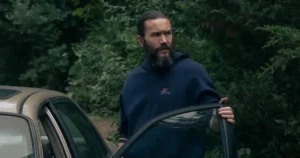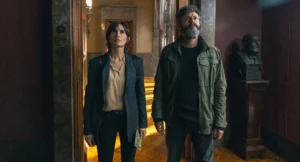Collateral is a four-part police procedural series, which uses interweaving subplots to present a picture of modern British society. It was written by David Hare, directed by S J Clarkson, and stars Carey Mulligan, John Simm and Billie Piper. Collateral was broadcast in the UK on BBC 2 in February 2018, and then across the rest of the world on Netflix from 9 March 2018.
Collateral opens on a busy pizza place, where the manager takes a phone call and sends Abdullah out on a delivery instead of the scheduled Mikey. Abdullah delivers the pizza to a flustered Karen. And just as he leaves her building, he is shot and killed, apparently by a sniper, witnessed only by one young woman hiding in the hedgerow. The remainder of the series is about the consequences – direct and peripheral – of this incident, for a number of different parties; some more conclusive than others.
The different parties include detectives, of course; the lead detective is DI Kip Glaspie, played by the lovely (and pregnant) Sally Swallow Carey Mulligan. She’s the sod-the-rules sort of detective, rather odd/troubled sort; she’s fascinated by the case and fills colleagues in on her thinking when it makes sense to do so, not before. Mulligan plays the role with absolute ease, but it’s undemanding, and she could possibly do it in her sleep. (Collateral itself is undemanding, but more on that later.)
Karen (Billie Piper) is the frazzled young mother who ordered the fatal pizza. Her character is dreadful, being taken care of by her child’s nanny more and more as she loses her grip on things (indeed reminds me of bimbo gangster’s wife in Kobiety mafii, though with less comedy or energy). Jane (Nicola Walker) is the local vicar, who wants to support everyone, do the right thing and keep her girlfriend. David Mars (John Simm) is the Labour MP for the constituency where all this takes place, and he has strong connections with both those characters. All three are easy for us to get to know: the personalities are laid out in front of us straight away, and they are the same as these actors have portrayed in other shows.

The one more interesting character, in my opinion, is Sandrine Shaw (Jeany Spark), the army captain who struggles with her purpose since returning to the UK. As well as her, the only roles which require nuanced performance are those of the victim’s two sisters, played by Ahd Hassan Kamel and July Namir (especially the former). And there are myriad supporting characters – more than we would normally expect in such a short series – each with their own issues to add shade and color to the busy picture that Collateral presents.
That’s the thing: Collateral isn’t a whodunit (that’s revealed early on) or a whydunit (watch The Sinner if that idea grabs you). The title may refer to Abdullah, but the shooting itself is not much more than a catalyst for all the subplots, each with their own piece of modern social commentary: immigration, homosexuals in the church, drugs, broken families and post-traumatic stress disorder (PTSD) in the military. And I may have missed one or two less obvious ones. It treats this small piece of London as a microcosm of British society, giving plenty of attention to those peripheral characters, and yet we hardly get to know the detectives at all. In fact, the attention given to the detectives is so slight that it hardly matters what clues they follow. They just follow some.
The cinematography is good, though, with sharp close-ups used appropriately and nice wide views to make an occasional contrast. The direction is good, too; giving suitable pace and tension here and there, especially towards the end. And I have no problem with dramas being used to present political or social ideas. But there were so many! It would have been so much better if Hare had written a police procedural drama with more care, and swept the other elements into Albert Square. Collateral would have benefited from some mystery too, but nearly everything is shown to the viewer, and we simply watch the pieces move.
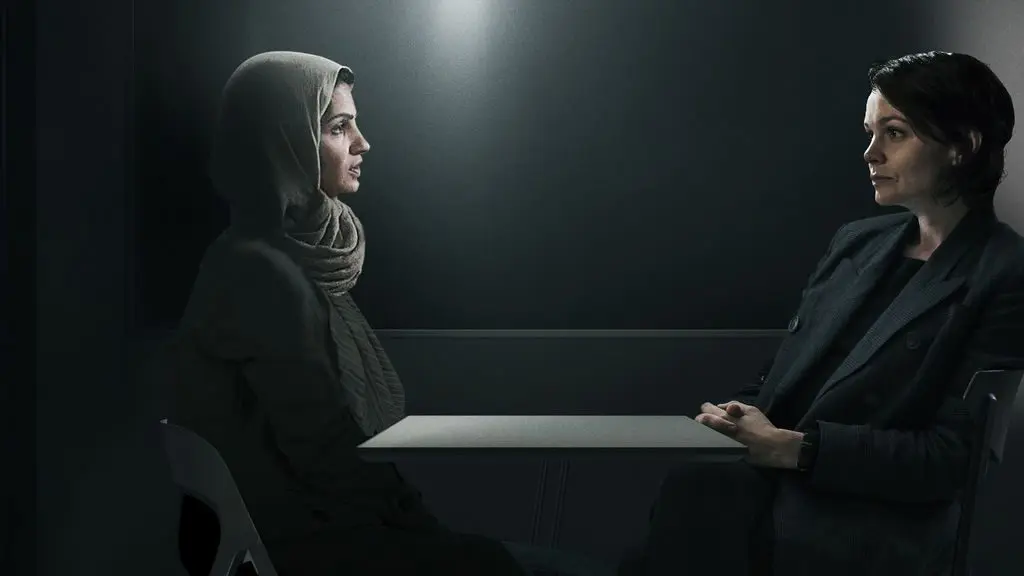
If you are looking for a good British police drama, this isn’t it: try Line of Duty instead. And if you want a broad picture of a modern city, choose a soap opera and follow it for a few months. Collateral demonstrates a mistake in blending the two together, and unfortunately, there is no compensation in the famous faces and decent direction.

